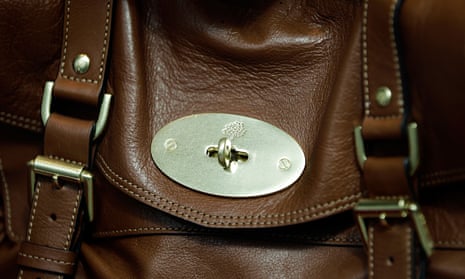Shares in handbag maker Mulberry have lost almost a fifth of their value yesterday after yet another shock profit warning, while shares in larger rival Burberry also fell after it warned that markets are getting tougher.
Mulberry shares were down more than 20% at one point, though recovered to close down 10% at 675p on Tuesday.
Burberry, known for its camel, red and black check raincoats, posted a 14% rise in first-half revenues to £1.1bn but cautioned that wholesale revenues would fall by a “mid single-digit percentage” in the second half.
Burberry boss Christopher Bailey warned of a “more difficult external environment”. Western sanctions against wealthy Russians imposed during the Ukraine crisis have hit demand for luxury goods, and mass democracy protests in Hong Kong, which closed off shopping districts, have exacerbated concerns about a slowdown in China, where the government has been cracking down on corrupt gift giving.
In its fourth profit warning this year, Mulberry said its first half had been even more difficult than expected in June, when it last sounded the alert on earnings. It expects profits for the full year to March 2015 to be “significantly below current expectations” as first-half revenues dived 17% to £64.7m.
Analysts at Barclays slashed their full-year profit forecast by 60% to £4m – against £14m last year (which had been a near halving from the year before). “Moving the brand to higher pricing points had clearly taken its toll on sales with the group responding by reverting back to its roots,” they said.
Mulberry’s executive chairman, Godfrey Davis, stuck to the prediction he made in June that turning around the brand would be a “two-year project”.
“When I took over, some of our core customers were quite disgruntled with pricing. We’ve taken steps to address that. I want us to be positioned where we’ve always been positioned: a genuine luxury product, modern luxury for men and women. We’ve always tried to give our customers a reasonable deal – bags made of very nice leather [priced at] £500 to £800,” he said.
Former chief executive Bruno Guillon, who was ousted in March, made an ill-fated attempt to move Mulberry into the upper echelons of the luxury elite, alongside Prada and Gucci, by selling bags priced over £1,000. Mulberry has struggled to keep up with trendy fashion brands such as Michael Kors which aim to offer luxury at a fraction of the price.
The Tessie Hobo, priced at £695 from Mulberry’s new Tessie bag range, launched in June, has become one of Mulberry’s bestselling bags, along with the Cara backpacks developed with model Cara Delevingne that hit the shops last month, and sales trends have improved in recent months. A £495 Blossom tote bag, the £350 Mini Lily and a new collection of small leather goods will be in the shops in November, in time for Christmas.
But Mulberry, along with the rest of the luxury industry, has been hit by a series of events such as the military coup in Thailand, the Hong Kong protests, and declining consumer confidence in the eurozone.
A study of global luxury trends from consultancy Bain & Company out yesterday predicted sales of designer clothes, leather goods and jewellery will grow just 2% to €223bn this year. The Chinese remain the world’s biggest shoppers, snapping up nearly a third of global luxury goods, but growth there is slowing.
Davis said: “What is happening in the business is broadly what I expected. A couple of factors were tougher than I expected: the decline in the tourist business in the UK, and our wholesale business is taking longer to recover.”
Mulberry’s UK retail sales dropped 12% to £20.9m in the six months to 30 September. International sales fared better, growing 20% to £7.5m. Wholesale sales slumped 31% to £19.6m as Mulberry’s Asian and European franchise partners ordered less from the Somerset handbag maker.
Mulberry is still searching for a new creative director after the highly regarded Emma Hill quit last year, as well as a chief executive to take over from Davis.
Independent City analyst Louise Cooper tweeted: “Mulberry is a basket case and Burberry a success story, LVMH is a better guide to industry, I think.”










Comments (…)
Sign in or create your Guardian account to join the discussion